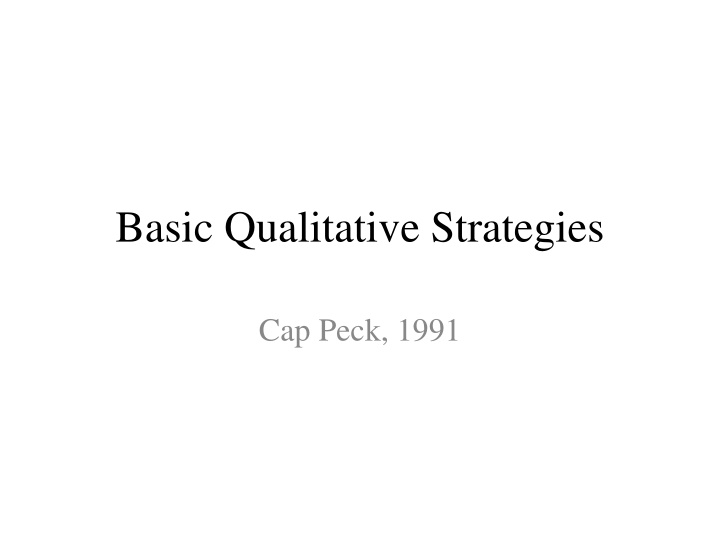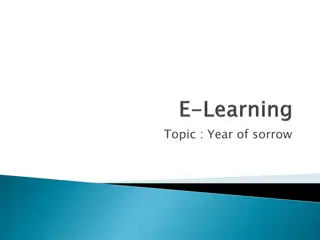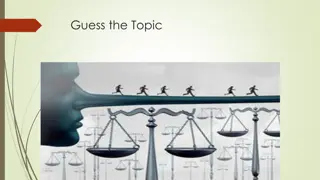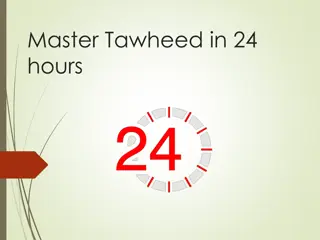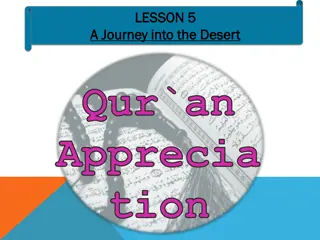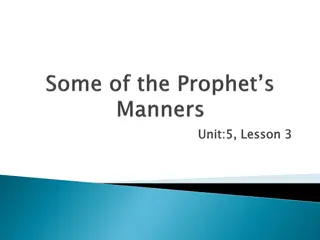The Life of Prophet Muhammad - Lessons and Stories
In this content, you will delve into various aspects of the life of Prophet Muhammad, including lessons from his encounters with the pagan practices, the story of the Hanging Tree, and the Battle of Hunayn. Discover how the Prophet navigated challenges, imparted wisdom, and set examples for his followers, drawing important lessons for Muslims to reflect on.
Download Presentation

Please find below an Image/Link to download the presentation.
The content on the website is provided AS IS for your information and personal use only. It may not be sold, licensed, or shared on other websites without obtaining consent from the author.If you encounter any issues during the download, it is possible that the publisher has removed the file from their server.
You are allowed to download the files provided on this website for personal or commercial use, subject to the condition that they are used lawfully. All files are the property of their respective owners.
The content on the website is provided AS IS for your information and personal use only. It may not be sold, licensed, or shared on other websites without obtaining consent from the author.
E N D
Presentation Transcript
Basic Qualitative Strategies Cap Peck, 1991
Research Question Beginning with less specific research questions Start with interests and a sense of the research situation Study designs (including the research question) emerge
Sampling Participants are identified for the information they may contribute. Sampling purposes Based on the types of information you need
Data Collection Observations Separate descriptions from interpretations Interviews Informants provide descriptions of culture and experience Grand tour questions
Data Analysis Done as data are collected in the study Conceptualizing themes for sorting Constant comparative Memos Theoretical notes Methodological notes Analytic memos
Trustworthiness Quantitative Reliability The degree to which data gathering remains consistent over different iterations or time. Quantitative Validity The degree to which you can defend what you think you found as what was really there. Qualitative reliability and validity are based on the degree to which a study is trustworthy.
Credibility Data gathering is: Prolonged Persistent Triangulated Peer briefing Negative case analysis Referential adequacy Member checks
Transferability Context bound description External validity Thick description Context Observation and interview
Audit Trails (Methods) Dependability Stability of the data Confirmability Neutrality of the data The reflexive journal Tracking biases and assumptions
Presenting Findings Case study description Pre-assigned coding systems Emergent themes Levels of abstraction Exemplars Diagramming relationships
Hermeneutics The importance of context in understanding Habermas Control (Clarification of causal relationships) Communication (Establishing understanding among actors) Emancipation (Transforming the givens) Why talk about this?
Mixed Methods
The Transition to Quantitative Creswell and Mixed Methods Design Where do they over lap? What do you need to know to use mixed methods? Study designs Exploratory Using qualitative methods to design quantitative data collection Explanatory Using qualitative methods to enhance a quantitative explanation Triangulation Using both: quantitative methods to enhance a qualitative explanation
Qualitative Validity (Trustworthiness)
Validity Research is valid when it is an accurate and generalizable description of the phenomenon being investigated. Generalizable beyond the study sample Accurate The study design and execution do not impact the results
Validity Research is valid when it is an accurate and generalizable description of the phenomena being investigated. Over the history of research we have adopted rules to establish validity of research. Follow the rules and you will have valid research.
Reliability and Validity The language for this is from the quantitative tradition scientific verification positivism. Habermas cognitive interest of control. In experimental research terminology: Can we assume that the treatment (independent variable) is the only cause of change in the thing being measured (dependent variable)?
Read Walcott Pay attention to how he attends to issues of validity in his work.
